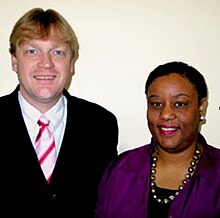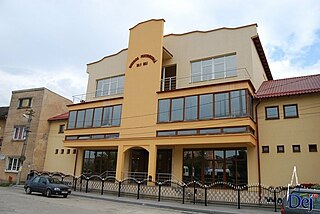
Destiny Church Groningen is a neo-charismatic church denomination which was founded in 1992 in Groningen, the Netherlands, by Johan and Tessa Proost.

Destiny Church Groningen is a neo-charismatic church denomination which was founded in 1992 in Groningen, the Netherlands, by Johan and Tessa Proost.
Destiny Church follows a Charismatic and Apostolic interpretation of Biblical principles. Its membership are predominantly Antillians from the island of Curaçao.
Destiny Church started with a membership of 17 people and within three years had grown to 600. Destiny Church has a network of 10 churches in the Netherlands, Aruba, Brazil, Italy, Portugal, Mexico and Rwanda. The church provides religious guidance and a range of social services such as homework groups, help in choosing schools, and helping young women who have been abused for prostitution.
From 1994 to 2005 Destiny Church was part of an apostolic organisation. Since 2005 it has been autonomous.
Like other neo-charismatic churches it embraced many of the doctrines and practices found within Pentecostal and Charismatic churches, however it is not specifically aligned with either movement.
According to its webpage it is known as a Word of Faith and a Dominion-minded Church with a New Apostolic Reformation church structure. This mixture of beliefs and theology is very common in neo-charismatic churches.
The Protestant Church in the Netherlands is the largest Protestant denomination in the Netherlands, being both Calvinist and Lutheran.
Pentecostalism or classical Pentecostalism is a Protestant Charismatic Christian movement that emphasizes direct personal experience of God through baptism with the Holy Spirit. The term Pentecostal is derived from Pentecost, an event that commemorates the descent of the Holy Spirit upon the Apostles and other followers of Jesus Christ while they were in Jerusalem celebrating the Feast of Weeks, as described in the Acts of the Apostles.

The Full Gospel Baptist Church Fellowship (FGBCF) or Full Gospel Baptist Church Fellowship International (FGBCFI) is a predominantly African-American, Charismatic Baptist denomination established by Bishop Paul Sylvester Morton—a Gospel singer and former National Baptist pastor. Founded as a response to traditional black Baptists upholding cessationism, Full Gospel Baptists advocate for the operation of Pentecostal and Charismatic Christian spiritual gifts, while also holding to some traditional Baptist doctrine.
The charismatic movement in Christianity is a movement within established or mainstream Christian denominations to adopt beliefs and practices of Charismatic Christianity with an emphasis on baptism with the Holy Spirit, and the use of spiritual gifts (charismata). It has affected most denominations in the US, and has spread widely across the world.
The Latter Rain, also known as the New Order or the New Order of the Latter Rain, was a post–World War II movement within Pentecostal Christianity which remains controversial. The movement saw itself as a continuation of the restorationism of early pentecostalism. The movement began with major revivals between 1948 and 1952 and became established as a large semi-organized movement by 1952. It continued into the 1960s. The movement had a profound impact on subsequent movements as its participants dispersed throughout the broader charismatic and pentecostal movements beginning in the 1960s.

The Fourth Great Awakening was a Christian awakening that some scholars – most notably economic historian Robert Fogel – say took place in the United States in the late 1960s and early 1970s, while others look at the era following World War II. The terminology is controversial, with some historians believing the religious changes that took place in the US during these years were not equivalent to those of the first three great awakenings. Thus, the idea of a Fourth Great Awakening itself has not been generally accepted.
Dominion theology, also known as dominionism, is a group of Christian political ideologies that seek to institute a nation that is governed by Christians and based on their understandings of biblical law. Extents of rule and ways of acquiring governing authority are varied. For example, dominion theology can include theonomy but does not necessarily involve advocacy of adherence to the Mosaic Law as the basis of government. The label is primarily applied to groups of Christians in the United States.

The New Apostolic Church (NAC) is a Christian church that split from the Catholic Apostolic Church during an 1863 schism in Hamburg, Germany.
The Neo-charismaticmovement is a movement within evangelical Protestant Christianity that is composed of a diverse range of independent churches and organizations that emphasize the current availability of gifts of the Holy Spirit, such as speaking in tongues and faith healing. The Neo-charismatic movement is considered to be the "third wave" of the Charismatic Christian tradition which began with Pentecostalism, and was furthered by the Charismatic movement. As a result of the growth of postdenominational and independent charismatic groups, Neo-charismatics are now believed to be more numerous than the first and second wave categories. As of 2002, some 19,000 denominations or groups, with approximately 295 million individual adherents, were identified as Neo-charismatic.
The Charismatic Episcopal Church (CEC), officially the International Communion of the Charismatic Episcopal Church (ICCEC), is a Christian denomination established in 1992. The ICCEC is a part of the Convergence Movement. Within North America, most of the Charismatic Episcopal Church's congregations and missions are located within the Northern, Southeastern, Midwest, and Western United States; it also has a presence in Texas, and in Western Canada.
The New Apostolic Reformation (NAR) is a movement which seeks to establish a fifth branch within Christendom distinct from Catholicism, Protestantism, Oriental Orthodoxy, and Eastern Orthodoxy. The movement largely consists of churches nominally or formerly associated with Pentecostal denominations and Charismatic movements but have diverged from traditional or classical Pentecostal and Charismatic theology in that it advocates for the restoration of the lost offices of church governance, namely the offices of prophet and apostle.

The Apostolic Faith Mission of South Africa (AFM) is a classical Pentecostal Christian denomination in South Africa. With 1.2 million adherents, it is South Africa's largest Pentecostal church and the fifth largest religious grouping in South Africa representing 7.6 percent of the population. Dr. Isak Burger has led the AFM as president since 1996 when the white and black branches of the church were united. It is a member of the Apostolic Faith Mission International, a fellowship of 23 AFM national churches. It is also a member of the South African Council of Churches.

The Assemblies of God USA (AG), officially the General Council of the Assemblies of God, is a Pentecostal Christian denomination in the United States. The Assemblies of God is the U.S. branch of the World Assemblies of God Fellowship, the world's largest Pentecostal body. With a constituency of 3,041,957 in 2011, the Assemblies of God was the ninth largest Christian denomination and the second largest Pentecostal denomination in the United States, growing to 3,295,923 in 2019. Since then, its adherents have declined to 2,928,143 in 2022.

The Pentecostal Union of Romania or the Apostolic Church of God is Romania's fourth-largest religious body and one of its eighteen officially recognised religious denominations. At the 2021 census, some 404,000 Romanians declared themselves to be Pentecostals. Ethnically, as of 2002, they were 85.2% Romanians, 10.6% Roma, 1.9% Ukrainians, 1.8% Hungarians and 0.5% belonged to other groups. They have 1,343 churches, 7,879 affiliates and 354 pastors, along with strong lay leadership. The denomination originates in the early 1920s and, headed by a central leadership, is divided into nine regional communities: Arad, Braşov, Bucharest, Cluj-Napoca, Constanţa, Oradea, Oltenia-Argeş (Craiova), Maramureş-Sătmar and Suceava. Membership is concentrated in Crişana, Banat and northern Moldavia.

Arij Lans Bovenberg is a Dutch economist, and Professor of Economics at the Tilburg University and Erasmus University, known mainly due to his contribution to the Dutch debate on population ageing, pension reforms and public finances. Lans Bovenberg was awarded the Spinoza Prize in 2003.

Estonia, historically a Lutheran Christian nation, is today one of the "least religious" countries in the world in terms of declared attitudes, with only 14 percent of the population declaring religion to be an important part of their daily life. This is thought to largely be a result of the Soviet occupation of Estonia in 1940, prior to which Estonia had a large Christian majority.

Charles Peter Wagner was an American missionary, writer, teacher and founder of several Christian organizations. In his earlier years, Wagner was known as a key leader of the Church Growth Movement and later for his writings on spiritual warfare.

Pentecostalism in Australia is a large and growing Christian movement. Pentecostalism is a renewal movement within Protestant Christianity that places special emphasis on a direct personal experience of God through baptism with the Holy Spirit. It emerged from 19th century precursors between 1870 and 1910, taking denominational form from c. 1927. From the early 1930s, Pentecostal denominations multiplied, and there are now several dozen, the largest of which relate to one another through conferences and organisations such as the Australian Pentecostal Ministers Fellowship. The Australian Christian Churches, formerly known as the Australian Assemblies of God, is the oldest and longest lasting Pentecostal organisation in Australia. The AOG/ACC is also the largest Pentecostal organisation in Australia with over 300,000 members in 2018. Until 2018, Hillsong Church was one of 10 megachurches in Australia associated with the ACC that have at least 2,000 members weekly. According to the church, over 100,000 people attend services each week at the church or one of its 80 affiliated churches located worldwide.
Charismatic Christianity is a form of Christianity that emphasizes the work of the Holy Spirit and spiritual gifts as an everyday part of a believer's life. It has a global presence in the Christian community. Practitioners are often called Charismatic Christians or Renewalists. Although there is considerable overlap, Charismatic Christianity is often categorized into three separate groups: Pentecostalism, the Charismatic movement, and the Neo-charismatic movement.